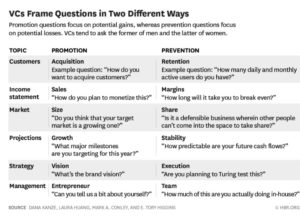How to Fight Sex Discrimination in Venture Capital
When hiring and promoting employees, companies manifest sex discrimination by judging men by their potential and women by their track records. This form of sex discrimination particularly impacts female entrepreneurs since venture capital firms highly value potential when betting on the future success of start-ups. (Today in the U.S., women own 38% of businesses but they receive only 2% of the funding given out by venture capital firms.)
Scholars at Columbia University and The Wharton School at the University of Pennsylvania recently completed studies to learn more about this phenomenon. They observed question and answer interactions between 140 prominent venture capitalists (40% female) and 189 entrepreneurs (12% female) at an annual startup funding competition, TechCrunch Disrupt New York.
Critically, venture capitalists of both genders tended to ask female entrepreneurs questions about their companies’ potential for losses (prevention questions), while they asked male entrepreneurs questions about their companies’ potential for gains (promotion questions).
Usually, entrepreneurs responded to the types of questions they received, giving prevention responses to prevention questions and promotion responses to promotion questions.
Every time a venture capitalist asked a prevention question and an entrepreneur responded with a prevention answer, the start-up lost $3.8 million on average compared to its peers.
The scholars concluded that the choice of promotion questions for men and prevention questions for women explained much of the gender gap in start-up funding.
What to do?
For now, entrepreneurs cannot challenge this type of discrimination with lawsuits because most discrimination laws do not cover the relationships between start-up founders and venture capital firms.
However, female entrepreneurs can mitigate much of the damage of discrimination by mindfully framing their answers as promotional regardless of the way venture capitalists framed their questions. For example, if a venture capitalist asked how a start-up would defend its market share, the entrepreneur could respond by focusing on the growth they envision in their target market. In the studies, those who received prevention questions but gave promotion answers received an average of $7.9 million in total funding while those who responded with prevention answers received an average of $563,000.
Women in other industries should consider using this promotional reframing technique in job interviews and other workplace situations.
Meanwhile, venture capitalists and employers must be mindful of the types of questions they are asking entrepreneurs and applicants. Ideally, interview questions should be scripted and asked at each interview for maximum fairness.
All the best,




